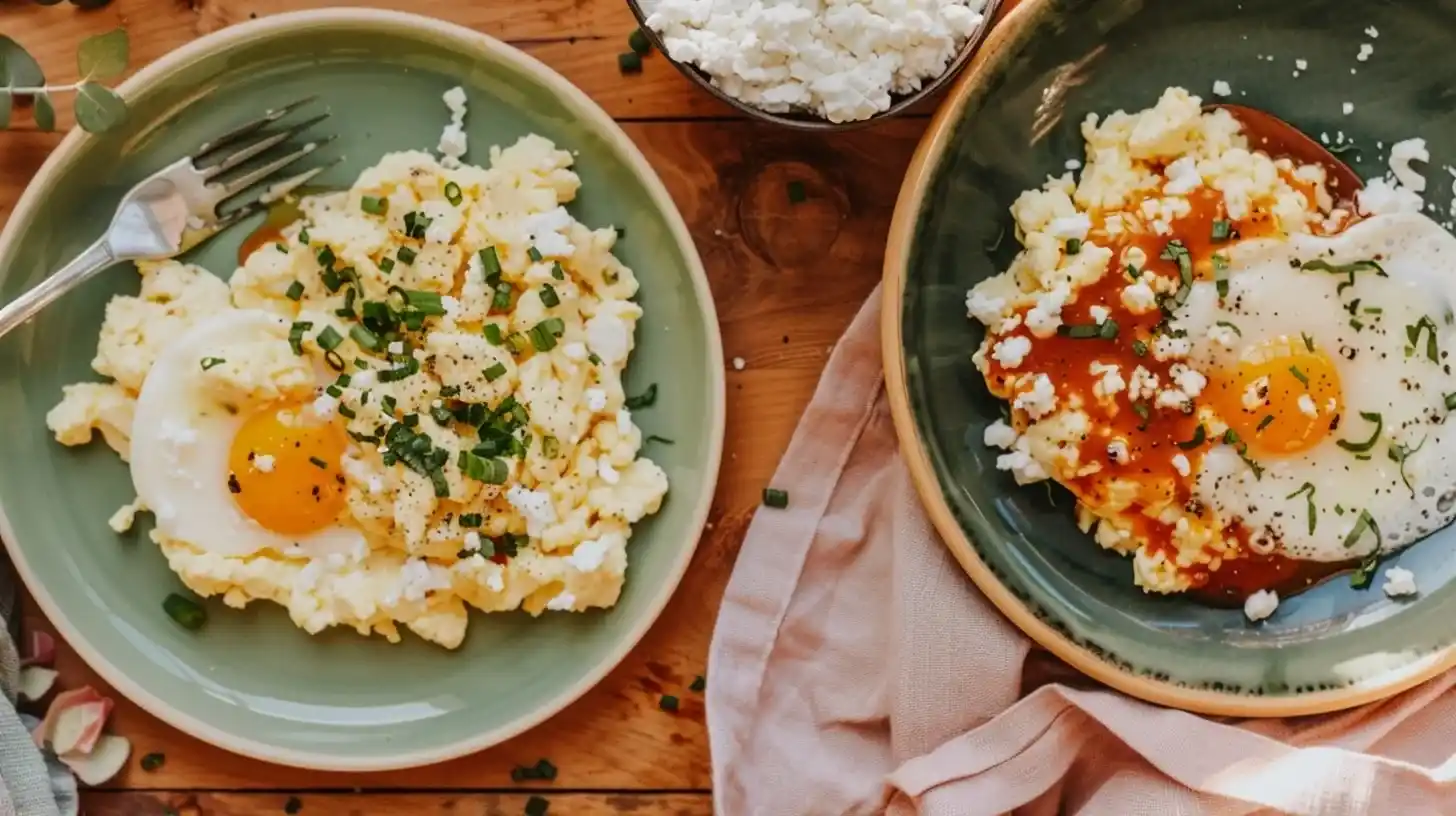The first time I watched my grandmother fold cottage cheese into scrambled eggs, I couldn’t hide my skepticism. “Trust me,” she winked, noticing my doubtful expression. “This is how we made eggs stretch during hard times, but we kept doing it even when times were good because they taste better this way.” One bite of those incredibly fluffy, protein-packed eggs transformed me from skeptic to believer in an instant.
That moment in my grandmother’s Kentucky kitchen sparked a lifelong appreciation for Cottage Cheese in Eggs a simple combination that elevates ordinary breakfast into something special. Over the years, as I’ve prepared eggs for my own family, cottage cheese has remained our “secret ingredient” for creating memorable morning meals that fuel busy days.
“Cottage cheese isn’t just a diet food,” my mother would say as she taught me to prepare her famous egg bake. “It’s a powerhouse ingredient that transforms everything it touches.” This wisdom, passed through generations of practical home cooks in my family, reveals the remarkable benefits that this humble ingredient brings to everyday egg dishes.
Table of Contents
Why Adding Cottage Cheese in Eggs Matters
Incorporating cottage cheese into your egg dishes elevates them nutritionally and texturally. Here’s why this combination deserves a place in your morning routine:
- Nutritional boost: Significantly increases protein content for sustained energy throughout busy mornings.
- Texture transformation: Creates remarkably fluffy, tender eggs that feel indulgent without added fat.
- Budget stretching: Economically extends egg dishes while enhancing their quality.
- Versatile application: Works in everything from simple scrambled eggs to elaborate breakfast casseroles.
- Family-friendly nutrition: Sneaks extra protein into picky eaters’ diets without resistance.
I’ve incorporated cottage cheese into many recipes, from a simple cottage cheese egg bake to scrambles and frittatas. Understanding the benefits of this combination has enhanced my protein-packed egg breakfasts collection and helped me avoid issues like why cottage cheese eggs get watery by applying proper techniques.
Cottage Cheese in Eggs 7 Powerful Benefits

1. Protein Powerhouse: Double the Nutrition
The most remarkable benefit of adding Cottage Cheese in Eggs is the significant protein boost it provides. While eggs themselves are a good protein source (about 6g per large egg), cottage cheese adds approximately 14g of protein per half cup—effectively doubling the protein content of your breakfast.
“Protein at breakfast sets the foundation for the entire day,” my nutritionist sister explains. “It stabilizes blood sugar, promotes satiety, and provides essential amino acids when your body needs them most.” This protein synergy creates breakfast with staying power—something I notice when my children remain focused and energetic through morning classes after enjoying cottage cheese eggs instead of cereal or toast.
For busy families rushing through morning routines, this quick, easy protein boost requires zero extra preparation time while significantly enhancing nutritional value. My husband, who exercises in the mornings, relies on cottage cheese scrambled eggs for sustained energy without heaviness.
2. Texture Transformation: Unparalleled Fluffiness
Adding Cottage Cheese in Eggs creates a remarkably light, fluffy texture that other ingredients simply cannot achieve. The curds melt into the eggs during cooking, creating tiny pockets of moisture and richness throughout.
My grandmother demonstrated this by preparing two batches of scrambled eggs side by side—one with cottage cheese, one without. “Notice how these hold their softness,” she said, pointing to the Cottage Cheese in Eggs which remained tender even after sitting briefly. The standard eggs, meanwhile, had already begun to toughen.
This textural magic happens because cottage cheese’s protein structure interrupts the egg proteins’ tendency to contract and toughen during cooking. For families seeking quick, easy breakfast options, this means more forgiving cooking times and eggs that remain tender even when preparation timing isn’t perfect.
3. Moisture Magic: Never Dry or Rubbery
The most common complaint about eggs—especially when reheated—is their tendency to become dry or rubbery. Cottage cheese acts as an insurance policy against this culinary disappointment.
“The moisture from cottage cheese stays trapped within the egg structure during cooking,” my mother explained while teaching me what cottage cheese does in baking. This same principle applies to eggs, creating a built-in moisture reserve that maintains tenderness even when eggs are cooked a minute too long.
For busy parents preparing breakfast while simultaneously packing lunches and finding missing permission slips, this forgiveness factor is invaluable. My make-ahead cottage cheese egg bakes remain deliciously moist when reheated, making them perfect for meal prep and quick weekday breakfasts.
4. Calcium Enhancement: Beyond Basic Nutrition
While eggs provide numerous nutrients, they lack significant calcium. Cottage cheese fills this nutritional gap beautifully, adding approximately 125mg of calcium per half cup—an important contribution to the 1000-1300mg daily recommendation for most people.
“Calcium at breakfast is especially valuable,” my pediatrician explained when discussing nutrition for my growing children. “It’s not just about bones—calcium plays crucial roles in muscle function, nerve transmission, and cellular processes throughout the day.”
This calcium boost is particularly valuable for busy families who might not consume dairy at other meals. My children, who sometimes resist drinking milk, unknowingly get a calcium head start through cottage cheese eggs at breakfast.
5. Culinary Versatility: Beyond Basic Scrambles
The cottage cheese-egg combination works beautifully across countless preparations—from basic scrambled eggs to elaborate frittatas, bakes, and omelets. This versatility makes it a perfect foundation for quick, easy breakfast variations that prevent meal fatigue.
My weekly meal rotation includes several Cottage Cheese in Eggs variations: Monday’s simple scramble with herbs, Wednesday’s vegetable-packed frittata, and weekend breakfast casseroles that can incorporate whatever ingredients need using from the refrigerator. “The cottage cheese is your constant,” my grandmother would say. “Everything else can change with the seasons or your pantry.”
This adaptability makes Cottage Cheese in Eggs perfect for busy families seeking variety without requiring entirely different recipes or techniques. One simple mixture becomes endless quick breakfast possibilities.
6. Satiety Satisfaction: Lasting Fullness
The combination of protein and fat in Cottage Cheese in Eggs creates remarkable satiety—that satisfied feeling that prevents mid-morning hunger crashes. This benefit stems from the complementary nutritional profiles of both ingredients.
“It’s the protein-fat combination that signals fullness to your brain,” my nutritionist sister explains. “Eggs contribute choline and healthy fats, while cottage cheese adds casein protein that digests more slowly than other proteins.”
For busy families, this translates to children who remain satisfied until lunch and adults who aren’t reaching for snacks by 10 AM. I’ve noticed this effect consistently—my family simply stays fuller longer on mornings when Cottage Cheese in Eggs are served, making this quick, easy breakfast solution particularly valuable on busy days.
7. Budget-Friendly Brilliance: Economical Excellence
In times of rising food costs, cottage cheese economically extends egg dishes while simultaneously improving their nutrition and texture. This practical benefit has made cottage cheese eggs a budget-friendly staple for generations of home cooks.
My grandmother initially incorporated cottage cheese into eggs during lean times, but continued the practice even when financially unnecessary because the results were superior. This resourcefulness—improving food while stretching ingredients—represents the practical wisdom of home cooks who developed techniques out of necessity that proved valuable beyond economic considerations.
For today’s families watching grocery budgets, Cottage Cheese in Eggs provide exceptional nutritional value per dollar while creating satisfying, protein-rich meals that require minimal time investment.
Incorporating Cottage Cheese into Your Egg Routine
Start with a basic ratio of 1/4 cup cottage cheese per two eggs for scrambles, or 1 cup cottage cheese to 6-8 eggs for larger bakes and casseroles. The cottage cheese can be added directly to beaten eggs—no pre-blending necessary unless you prefer a smoother texture.
For families with picky eaters, blending the cottage cheese briefly creates a smooth mixture with no visible curds. My children never detected the cottage cheese in their eggs until I finally revealed my “secret ingredient” when they were teenagers.
I hope these benefits inspire you to incorporate cottage cheese into your family’s egg dishes, creating quick, easy, protein-rich breakfasts that fuel busy days with both nutrition and flavor!
With warmth, Sophia

Fluffy Cottage Cheese Scrambled Eggs
Ingredients
- 4 large eggs
- 1/2 cup cottage cheese (small or large curd)
- 1 tablespoon butter or olive oil
- 1/4 teaspoon salt
- 1/8 teaspoon black pepper
- 1 tablespoon fresh chives or herbs of choice, chopped (optional)
- 1/4 cup shredded cheese (optional)
Instructions
- In a medium bowl, whisk eggs until well combined.
- Gently fold in the cottage cheese – no need to blend smooth unless you prefer no visible curds.
- Season with salt and pepper.
- Heat butter or oil in a non-stick skillet over medium-low heat.
- Pour in the egg-cottage cheese mixture and let it set slightly for about 30 seconds.
- Using a silicone spatula, gently fold and stir the eggs, allowing them to cook slowly for maximum fluffiness.
- When eggs are mostly set but still slightly moist (about 3-4 minutes), fold in optional chives and shredded cheese if using.
- Remove from heat while eggs still look slightly underdone – they'll continue cooking from residual heat.
- Serve immediately for the most delicious texture.

